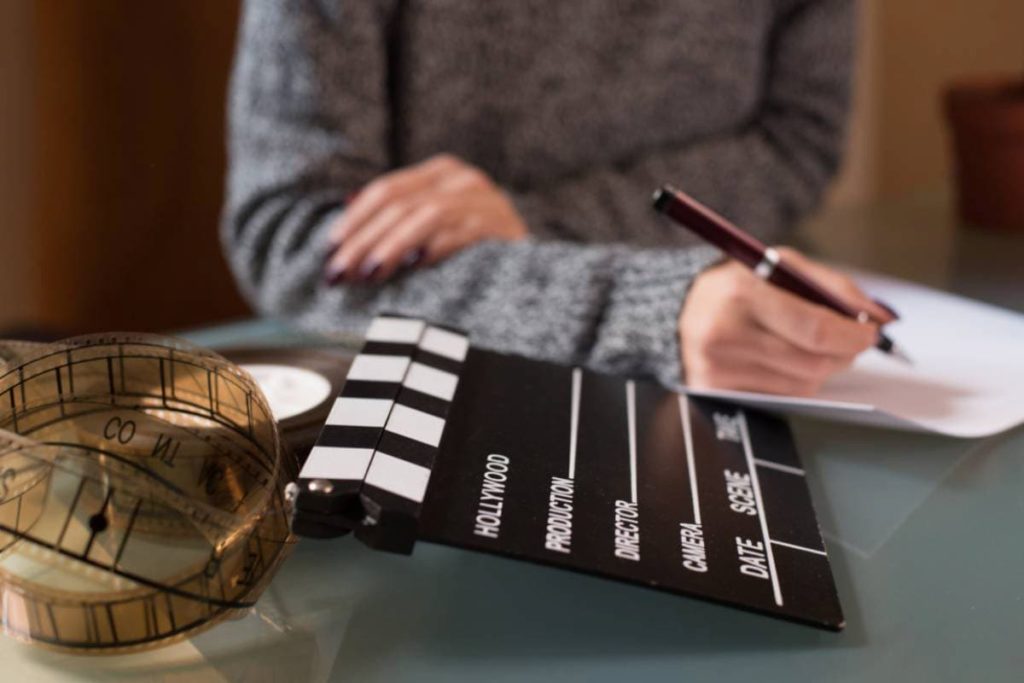Writers often have a specific vision in mind when crafting screenplays, and it’s common for many to want to be around during filming to see their work come to life. As a screenwriter, you likely want to ensure an appropriate interpretation of your script that matches what you envisioned. However, the chances are slim that you’ll be allowed on set and given such an opportunity.
Screenwriters typically do not get to be on set, as they aren’t needed during production. Directors may ask screenwriters on set to assist with dialog revisions, though this is rare. However, you may not want to be on set, as many say the experience is boring at best or frustrating at worst.
Are you curious to know if you might get the chance to watch the production of your screenplays? This post explains why screenwriters usually aren’t allowed on set. We’ve also considered exceptions, as shared by professionals who have been on set for one reason or another.

Screenwriters Typically Are Not Needed on Set
As a screenwriter, your responsibility is the screenplay. You’re not needed during production, as you’re part of pre-production, and your job is over by the time the script is on set.
Except for being needed for rewrites, and don’t hold your breath waiting for that, once you’ve given a director your shooting draft or “lock,” you’ve completed your end of this deal. Besides, it could be a bad sign if the director or an actor requests a dialogue revision. And if you have any confidence in your writing, you shouldn’t expect modifications to be needed.
Moreover, many directors or producers may hire someone else entirely for such a task. Some screenwriters who are asked to stick around during production admit it’s not usually all that exciting. You must sit through hours of setup for mere minutes of filming, and you’re not needed very often.
Days are spent following along and paying attention to the director’s decisions while actively staying out of the way.
Directors Decide if Screenwriters Get To Be on Set
Typically, the decision to allow screenwriters on set comes from the director, but there are no formal rules that require, prohibit, or dictate anything in this regard. For instance, it may depend on who the director is, their relationship with the writer, where production is happening, or if the actors desire changes.
However, by and large, directors tend to restrict writers from the set.
Markedly, many writers have difficulty restraining themselves from getting involved with every tiny detail with production. And as you might suspect, directors usually want to avoid this.
Screenwriters May Not Want To Be on Set
Unless you’re genuinely interested in learning the filming process, you may determine that you don’t want to be on set. Many writers have expressed having a hard time watching their writing be misinterpreted and not getting involved.
One writer shared an experience of being invited on set only to endure actors mispronouncing names or putting incorrect emphasis on words.
He said he decided to leave before others had to ask him to.
Consider how you might react to the director and actors improvising and messing with your script. If you don’t have a thick enough skin to potentially allow your ego to revise what you think are some of your best lines, you may be in for a world of hurt.

It’s Rare for Screenwriters To Always Be on Set
Even if screenwriters are asked to be on set, it’s unlikely they’d need to be there every day of filming. Notably, it’s said that Roman Polansky always had Ronnie Harwood on set when shooting The Pianist. He was even asked to sit in on editing, which is incredibly rare.
Stanley Kubrick has also been known to keep writers on set, utilizing Terry Southern for Doctor Strangelove and fellow co-author Arthur C. Clark for 2001: A Space Odyssey.
Still, in most cases, it’s unlikely that you’ll be asked on set at all.
Screenwriters Sometimes Get Banned From Being on Set
Again, screenwriters typically aren’t involved in the production process, as they usually aren’t needed.
Yet, should an exception arise, or if the director allows personal interest visits to the set, a writer on set can become a distraction. And if their presence becomes an issue, directors have been known to ban writers from the set.
Do’s and Don’ts for Screenwriters on Set
If you do get invited on set for whatever reason, it’s important to maintain a certain etiquette while you’re there. Here are some basic do’s and don’ts for screenwriters on set:
- DO pay attention. Be sure to follow along with every scene and line of the script and all decisions made as best you can so you can assist with expertise at any time. If you haven’t been tuned into what’s happening or how scenes have been shot, you won’t be able to suggest any practical solutions.
- DON’T take things personally. You might lose some of your favorite lines to improv or other creative decisions, and you mustn’t hold a grudge against such things.
- DO learn from the experience. There’s a lot that happens during the long days during shooting. Take in everything you can, being as passively involved as possible to ensure you gain the most from every day you spend on set. This is also a great way to bond with the cast and crew, thus making friends and relationships that potentially network you into future projects.
- DON’T challenge the hierarchy. Should you have a concern with an alteration to your script, and you feel those in charge aren’t listening to you or addressing the issue properly, don’t try to sidestep them and get others involved. It generally doesn’t bode well for your career if you can’t respect the politics and general chain of command on set.
Final Thoughts
It’s uncommon for screenwriters to be on set, at least for the entire production. Should you be asked on set for any reason, make sure to stay professional and learn as much as possible from being there.

